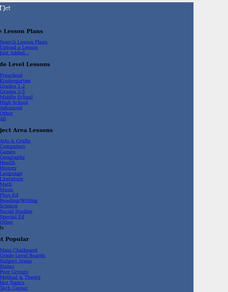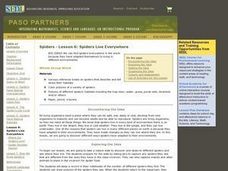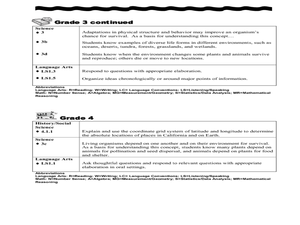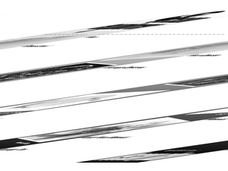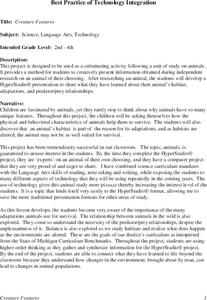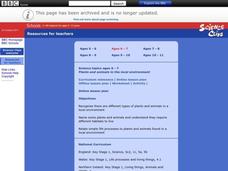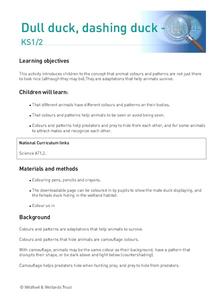Curated OER
Personal Ecosystem
Learners build an aquatic ecosystem using large glass pickle jars. In this ecology lesson plan, students build and ecosystem then observe and collect data on the habitats. In this long term project learners observe a...
Curated OER
Animal Trackers
Learners use space technology to monitor migratory species, map their movements, and gather data about their habitats and possible responses to climatic shifts.
Curated OER
River Otter Adaptations
Students study the body of the River Otter to understand animal adaptations to their habitats. In this animal adaptations lesson, students study the photo of the River Otter and discuss its body. Students then play a game of...
Curated OER
Zoo Animal Facts
Students create a fact sheet naming an animal's habitat, distinguishing characteristics, eating type, country of origin, and any interesting information that they research. They illustrate their fact sheet and sheets are compiled into a...
Curated OER
Puerto Rican Parrot Paradise
Young scholars investigate the environment of the Puerto Rican Parrot. They visualize the ecosystem with and without information. They conduct research to find information and participate in classroom discussion to demonstrate...
Curated OER
Earth Pockets
Students identify the Earth's natural resources. In this Earth science lesson, students read the book The Great Kapok Tree and discuss types of natural resources. Students use categories such as wood, paper, and trees and list items that...
Curated OER
To See or Not to See
Students identify and discuss key factors that determine how effective color camouflage is in certain habitats. For this investigative lesson students divide into groups and study light.
Curated OER
Forests/Natural Resource Management II
Students write about the importance of trees. In this natural resources lesson, students look at deforestation occurring across the globe and present what they learned to the class. As closure, all students write a poem about the...
Curated OER
It's not just pretty - it's a survival method!
First graders write explanations for why certain animals can only live in certain environments. In this animal survival lesson plan, 1st graders take pictures of animals and place them into the right environment after a lesson on the...
Curated OER
You Can Depend on Me
Students identify how they depend on others, and examine and discuss the images on the California Quarter Reverse. They view and discuss images of various habitats, complete a Habitat Research worksheet, and create a habitat diorama.
Curated OER
Creature Features
Students investigate animals and how they adapt to their environment. They design a multimedia presentation that includes information about an animal of their choice. They include a title card, habitats, adaptations, and a predator/ prey...
Curated OER
The Environments of Big Sur:Which Do We Protect?
Learners examine the California environments. In this environmental lesson, students examine the various ecosystems of California, creating a presentation on how these environments impact Big Sur. They write a paper defending their point...
Curated OER
Which Bear?
Students study bears. In this science lesson, students compare black, grizzly and polar bears. Students measure the bear tracks and compare the bear habitats and diet.
Curated OER
Plants and Animals in the Local Environment
Students recognize the different types of plants and animals living in a local environment. They determine how they require different habitats to live, and relate simple life processes to plants and animals found in local environments.
Curated OER
Biomes/ecosystems
Fifth graders examine ecosystems through a variety of activities including an Internet hunt, work at centers, and building a diorama on a specific habitat.
Alabama Learning Exchange
Is That a Whale?
Pupils research the characteristics and examples of the two main types of whales. They work in groups to study the habitats of each type of whale before developing a slideshow presentation of the information.
Curated OER
Feet Are Neat
Students describe several types of bird feet and explain how each type helps a bird survive in its habitat. Students then match birds to their feet and mold bird feet out of clay.
Curated OER
Animal Adaptation
Students begin the lesson by observing animals in their natural habitat. Using the internet, they research the types of adaptations they have gone through to be able to live comfortably in their environment. They observe what they see on...
Curated OER
Save A Reef!
Students identify the major threats to coral reefs and the ways that they benefit from humans. In this coral reef conservation lesson students create a public education program on coral reefs.
Curated OER
Dull Duck, Dashing Duck
Students learn about animal camouflage. In this animal adaptations lesson, students discuss the patterns and adaptations animals use to help them survive, discuss the uses of camouflage, visit a local wetland if possible, and...
Curated OER
Models of Succession
Students create a model city in order to understand the effects human habitats have on the environment. In this environment lesson, students examine the effects human habitats have on the environment. Students create a model...
Curated OER
Radical Raptors
Students study the lifestyles and habitats of raptors that live in Minnesota. They play games associated with their study.
Curated OER
Rainforests: What Are They?
Second graders investigate rain forests by reading a habitat checklist. In this environment lesson, 2nd graders read the book The Great Kapok Tree, and discuss what characteristics make up a rain forest. Students explore a...





